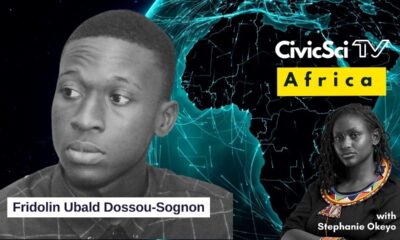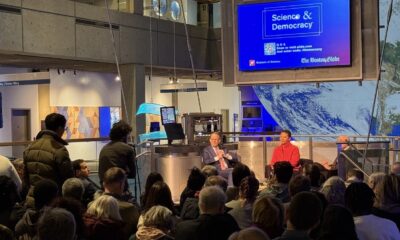Stories in Science Special Series
Bringing the Bench to Life
Steven J. Del Signore: “As a basic cell biologist who uses fruit flies as a model organism to investigate the causes of neurological disease, the gap between my science and its potential impact on human health at times feels very wide.”

Steven J. Del Signore
[su_boxbox title=”About”]Dr. Steven J. Del Signore is a postdoctoral fellow in Avi Rodal’s lab at Brandeis University where he investigates neuronal cell biology and disease using the fruit fly as a model system. He loves to play with microscopes in the lab and with his two labs everywhere else. Cover image by Gerd Altmann from Pixabay. [/su_boxbox]
[su_boxnote note_color=”#c8c8c8″]Key Points
- Take the time to engage with your community more broadly and accessibly.
- Don’t underestimate the broader impact of basic scientific discoveries.[/su_boxnote]
[dropcap]A[/dropcap]s a basic cell biologist who uses fruit flies as a model organism to investigate the causes of neurological disease, the gap between my science and its potential impact on human health at times feels very wide. That gap vanished one day when Kristina, the mother of a young boy who lives with Lowe Syndrome contacted me and my mentor, Avi Rodal (read her story in science), about our work on the disease.

Dr. Steven J Del Signore
Lowe Syndrome is a rare genetic disorder that causes many serious problems, including intellectual disability and seizures. We know the disease is caused by mutations in a gene called OCRL, but it has been difficult to lock down precisely how these cause the constellation of symptoms that patients can experience. This is because OCRL affects many processes inside cells and because most work on OCRL has been done on cells cultured in dishes.
We reasoned that studying OCRL in an intact organism might help us diagnose which of the many OCRL functions were important in causing disease. Our approach was to delete the OCRL gene in fruit flies and then determine how this affected neurons. Rather than the expected neurological problems, we found that the developing flies showed signs of excess inflammation. As much as I love being right, this was a striking example of how being wrong can take you down a much more fruitful line of investigation.
And I learned that we had each in our own way come up with a similar hypothesis about what might be causing some aspects of the disease.
Using the powerful genetic tools the fruit fly provides, we were able to trace the cause of the inflammation to a group of cells of the innate immune system that resemble human macrophages. We learned that OCRL was required in those cells to hold back a signal that triggers inflammation. This was exciting because similar cells and signals have been linked to epilepsy in people. This suggested a brand new hypothesis – that inflammation might contribute to seizures in Lowe Syndrome patients.
So when I was contacted by Kristina I was extremely interested to learn that there had been much discussion among parents who had observed signs of inflammation in their sons. She reached out to us originally because she had just read a paper from another group that suggested a new strategy for attacking the disease and hoped to know more about what next steps might bring these new findings to the clinic.
As I shared what I could, I in turn learned how parents used group discussions to share their personal experiences, challenges, and successes in managing this disease. And I learned that we had each in our own way come up with a similar hypothesis about what might be causing some aspects of the disease. We don’t know yet whether we are correct, but we are planning additional experiments to test this idea in human cells.
Metrics
Sessions
Total number of Sessions. A session is the period time a user is actively engaged with the page.
Visitors
Users that have had at least one session within the selected date range. Includes both new and returning users.
Page views
Pageviews is the total number of time the article was viewed. Repeated views are counted.
The CS Media Lab is a Boston-anchored civic science news collective with local, national and global coverage on TV, digital print, and radio through CivicSciTV, CivicSciTimes, and CivicSciRadio. Programs include Questions of the Day, Changemakers, QuickTake, Consider This Next, Stories in Science, Sai Resident Collective and more.

-
Audio Studio1 month ago
“Reading it opened up a whole new world.” Kim Steele on building her company ‘Documentaries Don’t Work’
-
 Civic Science Observer1 week ago
Civic Science Observer1 week ago‘Science policy’ Google searches spiked in 2025. What does that mean?
-
Civic Science Observer1 month ago
Our developing civic science photojournalism experiment: Photos from 2025
-
Civic Science Observer1 month ago
Together again: Day 1 of the 2025 ASTC conference in black and white
Contact
Menu
Designed with WordPress
























